The Constitution, The Government, and
The Doctrine of Social Contract
Appearance docket. A docket kept by the clerk of the court in which appearances are entered, containing also a brief abstract of all the
proceedings in the cause. Common law classifications. At common law an appearance could be either compulsory or voluntary, the former where it was compelled
by process served on the party, the latter where it was entered by his own
will or consent, without the service of process, though process may be outstanding.
Also, optional when entered by a person who intervened in the action
to protect his own interests, though not joined as a party; conditional,
when coupled with conditions as to its becoming or being taken as a general
appearance; gratis, when made by a party to the action, but before
the service of any process or legal notice to appear; de bene esse,
when made provisionally or to remain good only upon a future contingency;
or when designed to permit a party to a proceeding to refuse to submit his
person to the jurisdiction of the court unless it was finally determined
that he had forever waived that right; subsequent, when made
by a defendant after an appearance had already been entered for him by the
plaintiff; corporal, when the person was physically present in court. Initial appearance. A court proceeding for a defendant charged with a felony, during which the judge advises the defendant to the charges against him and of his right, decides upon bail and/or other conditions of
release, and sets the date for a preliminary hearing. See e.g.Fed.R.Crim. P. 5. Notice of appearance. A notice given by defendant to a plaintiff that he appears in the action in person or by attorney. — Black's Law Dictionary 
Citizen. One who, under the Constitution and laws of the United States,
or of a particular state, is a member of the political community, owing allegiance
and being entitled to the enjoyment of full civil rights. All persons
born or naturalized in the United States, and subject to the jurisdiction
thereof, are citizens of the United States and of the state wherein they
reside. U.S. Const., 14th Amend. The term may include or apply to children of alien parents born
in United States, Von Schwerdtner v. Piper, D.C.Md., 23 F.2d 862, 863; U.S.
v. Minoru Yasui, D.C.Or., 48 F.Supp., 40, 54; children of American
citizens born outside United States, Haaland v. Attorney General of United
States, D.C.Md., 42 F.Supp. 13, 22; Indians, United States v. Hester,
C.C.A.Okl., 137 F.2d 145, 147; State v. McAlhaney, 220 N.C. 387, 17
S.E.2d 352, 354; national banks, American Surety Co. v. Bank of California,
C.C.A.Or., 133 F.2d 160, 162; nonresident who has qualified as administratrix of estate of deceased resident, Hunt v. Noll, C.C.A.Tenn., 112 F.2d 288, 289.
However, neither the United States nor a state is as citizen for purposes
of diversity jurisdiction. Skandia American Reinsurance Corp. v. Schenck,
441 F.Supp. 715; Jizemerjian v. Dept. of Air Force, 457 F.Supp. 820.
On the other hand, municipalities and other local governments are deemed
to be citizens. Rieser v. District of Columbia, 563 F.2d 462.
A corporation is not a citizen for purposes of privileges and immunities
clause of the Fourteenth Amendment, D.D.B. Realty Corp. v. Merrill, 232 F.Supp.
629, 637. "Citizens" are members of a political community who, in their associated capacity, have established or submitted themselves to the dominion of a government
for the promotion of their general welfare and the protection of their individual
as well as collective rights. Herriott v. City of Seattle, 81 Wash.2d
48, 500 P.2d 101,109. — Black's Law Dictionary 
CONSTITUTION. The fundamental law of a state, directing the principles upon which the government is founded, and regulating the exercise
of the sovereign powers, directing to what bodies or persons those powers
shall be confided and the manner of their exercise. Constitution, in the former law of the European continent,
signified as much as decree, -a decree of importance, especially ecclesiastical
decrees. The decrees of the Roman emperors referring to the jus
circa sacra,contained in the Code of Justinian, have been repeatedly
collected and called the Constitutions. The famous bull Unigenitus
was usually called in France the Constitution. Comprehensive laws or
decrees have been called constitutions; thus, the Constitutio Criminalis
Carolina, which is the penal code decreed by Charles V. for Germany,
the Constitutions of Clarendon (q.v.). In political law the
word constitution came to be used more and more for the fundamentals of a
government, - the laws and usages which give it its characteristic feature.
We find, thus, former English writers speak of the constitution of the Turkish
empire. These fundamental laws and customs appeared to our race especially
important where they lim-
|
![]()
![]()

![]()
 We usually think of legitimate governments as being created by constitutions. We think of constitutions as being written under the auspices of the people, but that isn't necessarily true. A constitution might be written by
any despot. Such a constitution might specify the forms and functions of the government while having nothing whatsoever to do with rights, or with
the will of the people. The U.S. constitution is exactly such a constitution.
Note, for example, that the word rights is mentioned only once, in
the entire original U.S. constitution, and that's with regard to patents
and copyrights. Those aren't rights of the people. They're monopolies,
enforced by government, for the benefit of a privileged few, and the detriment
of everybody else. The U.S. constitution doesn't address rights at
all.
We usually think of legitimate governments as being created by constitutions. We think of constitutions as being written under the auspices of the people, but that isn't necessarily true. A constitution might be written by
any despot. Such a constitution might specify the forms and functions of the government while having nothing whatsoever to do with rights, or with
the will of the people. The U.S. constitution is exactly such a constitution.
Note, for example, that the word rights is mentioned only once, in
the entire original U.S. constitution, and that's with regard to patents
and copyrights. Those aren't rights of the people. They're monopolies,
enforced by government, for the benefit of a privileged few, and the detriment
of everybody else. The U.S. constitution doesn't address rights at
all.  Most amendments in the Bill of Rights embody some such phoney limitation of power. Another example is the power of eminent domain. It exists
because of the Fifth Amendment, not in spite of it.
Most amendments in the Bill of Rights embody some such phoney limitation of power. Another example is the power of eminent domain. It exists
because of the Fifth Amendment, not in spite of it.  The U.S. constitution doesn't have a title. Instead, it begins at the Preamble, without any heading at all, title or otherwise. The Preamble refers to the document as "this Constitution for the United States of America". That isn't a title. Worse yet, the statement can't be construed so as
to ensure that the constitution that contains it is the only such constitution in existence. It's only "this" constitution. The word this might designate one thing among several others. Thus, "this Constitution for the United States of America" could be one of several other constitutions. Bouvier's comment on contracts applies equally as well to constitutions as
it does to any other contract. Words, in constitutions as in other contracts,
are to be taken, if possible, in their comprehensive and common sense.
The U.S. constitution doesn't have a title. Instead, it begins at the Preamble, without any heading at all, title or otherwise. The Preamble refers to the document as "this Constitution for the United States of America". That isn't a title. Worse yet, the statement can't be construed so as
to ensure that the constitution that contains it is the only such constitution in existence. It's only "this" constitution. The word this might designate one thing among several others. Thus, "this Constitution for the United States of America" could be one of several other constitutions. Bouvier's comment on contracts applies equally as well to constitutions as
it does to any other contract. Words, in constitutions as in other contracts,
are to be taken, if possible, in their comprehensive and common sense.  Why is that important? It's important because sources, references,
and so forth that are used in legal proceedings must be cited accurately
and unambiguously. That's true of all legal proceedings, such as court cases, treaties, declarations of war, legislation, and so forth. So,
what about those proceedings that formally refer to or inherently rely for
their validity on a document called "The Constitution of the United States
of America"? That alleged title doesn't even agree with the one that
appears in the Preamble. It's different by an article and a preposition.
In either case, there isn't any original document in existence with either
title. Any alleged copy of the U.S. constitution that bears either
of those titles isn't a true and accurate copy of the original. Any
reference to such a document is invalid.
Why is that important? It's important because sources, references,
and so forth that are used in legal proceedings must be cited accurately
and unambiguously. That's true of all legal proceedings, such as court cases, treaties, declarations of war, legislation, and so forth. So,
what about those proceedings that formally refer to or inherently rely for
their validity on a document called "The Constitution of the United States
of America"? That alleged title doesn't even agree with the one that
appears in the Preamble. It's different by an article and a preposition.
In either case, there isn't any original document in existence with either
title. Any alleged copy of the U.S. constitution that bears either
of those titles isn't a true and accurate copy of the original. Any
reference to such a document is invalid. 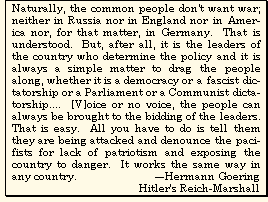 The range of the powers delegated in the U.S. constitution is enormous and, by Article 1, Section 8, clause 18, the Congress has the power to do whatever it takes to execute them. The only limits are that the resulting legislation
must be necessary and proper, and that is entirely at the discretion of the
Congress. Changes in the membership of the Congress by way of elections
are irrelevant. The institution, itself, is continuous. See Hermann
Goering's comment.
The range of the powers delegated in the U.S. constitution is enormous and, by Article 1, Section 8, clause 18, the Congress has the power to do whatever it takes to execute them. The only limits are that the resulting legislation
must be necessary and proper, and that is entirely at the discretion of the
Congress. Changes in the membership of the Congress by way of elections
are irrelevant. The institution, itself, is continuous. See Hermann
Goering's comment.  Since the jurisdictions aren't always clearly defined, they most often must
be deduced from the powers delegated. Other students of the U.S. constitution might discover a different set of jurisdictions. I consider this ambiguity
to be a serious deficiency in the U.S. constitution.
Since the jurisdictions aren't always clearly defined, they most often must
be deduced from the powers delegated. Other students of the U.S. constitution might discover a different set of jurisdictions. I consider this ambiguity
to be a serious deficiency in the U.S. constitution. 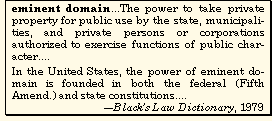 Methods are provided in the U.S. constitution for the acquisition of title
to property. One method of acquiring title to real property owned by
states is provided in Article 1, Section 8, clause 17, previously quoted.
That isn't the only method of acquiring title to property. The U.S.
constitution also allows the federal government to acquire title to private
property. That provision is part of the Fifth Amendment.
Methods are provided in the U.S. constitution for the acquisition of title
to property. One method of acquiring title to real property owned by
states is provided in Article 1, Section 8, clause 17, previously quoted.
That isn't the only method of acquiring title to property. The U.S.
constitution also allows the federal government to acquire title to private
property. That provision is part of the Fifth Amendment.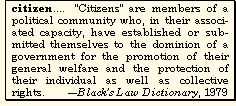 Such oaths continue to exist today, in more legally binding forms.
For example, the Immigration Reform and Control Act of 1986 required anyone who wanted to be employed to complete an INS Form I-9. That form contained
an attestation, under penalty of perjury, of citizenship. Presumably
that form, or its successor, still does. That oath is even more coerced
than the childhood pledge, because there's little alternative to employment.
The difference is that adults are competent to bind themselves, and the Form
I-9 can be produced in court. The requirement has the effect of compelling
people into the jurisdiction of the U.S. government, whether or not they
want to be in that jurisdiction.
Such oaths continue to exist today, in more legally binding forms.
For example, the Immigration Reform and Control Act of 1986 required anyone who wanted to be employed to complete an INS Form I-9. That form contained
an attestation, under penalty of perjury, of citizenship. Presumably
that form, or its successor, still does. That oath is even more coerced
than the childhood pledge, because there's little alternative to employment.
The difference is that adults are competent to bind themselves, and the Form
I-9 can be produced in court. The requirement has the effect of compelling
people into the jurisdiction of the U.S. government, whether or not they
want to be in that jurisdiction. 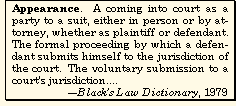 When an individual appears as a party to any subject matter, either before the Supreme Court or before an inferior court, that individual voluntarily submits to the jurisdiction of the court.
When an individual appears as a party to any subject matter, either before the Supreme Court or before an inferior court, that individual voluntarily submits to the jurisdiction of the court. 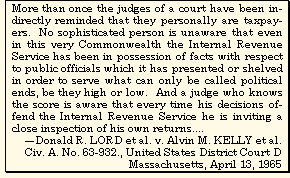 District Judge Wyzanski reminded us, while apologetically ruling in favor
of the IRS, that discipline imposed upon the judges isn't limited to that
of the Congress. This is a de facto jurisdiction that has resulted from the operation of the executive agencies. It might not be a lawful jurisdiction but the careers, reputations, and private lives of the judges are vulnerable to it.
District Judge Wyzanski reminded us, while apologetically ruling in favor
of the IRS, that discipline imposed upon the judges isn't limited to that
of the Congress. This is a de facto jurisdiction that has resulted from the operation of the executive agencies. It might not be a lawful jurisdiction but the careers, reputations, and private lives of the judges are vulnerable to it. 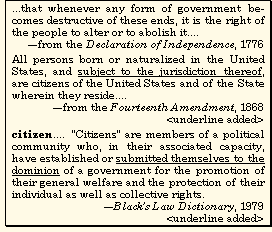 A general failure of the U.S. constitution appears in Section 1 of the Fourteenth Amendment. That provision declares that citizens are under the jurisdiction (power and control) of the U.S. government. The status of citizens is
confirmed in Black's Law Dictionary. Such dominion of a government
over the people is a direct violation of the doctrine expressed in the Declaration
of independence, whereby the people have the right to alter or to abolish
the government. They can't do that if they're under its jurisdiction
(power and control). The Fourteenth Amendment contains an undeniable
violation of the Doctrine of Social Contract.
A general failure of the U.S. constitution appears in Section 1 of the Fourteenth Amendment. That provision declares that citizens are under the jurisdiction (power and control) of the U.S. government. The status of citizens is
confirmed in Black's Law Dictionary. Such dominion of a government
over the people is a direct violation of the doctrine expressed in the Declaration
of independence, whereby the people have the right to alter or to abolish
the government. They can't do that if they're under its jurisdiction
(power and control). The Fourteenth Amendment contains an undeniable
violation of the Doctrine of Social Contract.